

TEDxWilliamsport - Dr. Derek Cabrera - How Thinking Works. Normalization Process Theory. James Le Fanu. Rethinking Medicine - Home. Sustainable Healthcare Education. Systems healthcare: a holistic paradigm for tomorrow. AD is the most common form of dementia in the United States [24], and around the world.
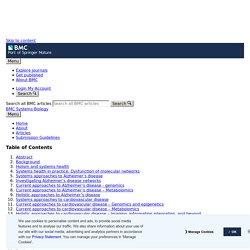
AD is also the most common neurodegenerative disorder, and currently has no cure, disease-modifying therapies, or effective treatments. Age is the greatest overall risk factor, with the prevalence doubling every five years after age of 65, and eventually reaching nearly 50% prevalence at age 85 [25, 26]. Those over age 65 are projected to increase to exceed 85 million in 2050 [27]. The healthcare costs for this group alone will eclipse $1.2 Trillion by that same year. Without options to delay the onset of AD, the economic costs, healthcare burden, and social impact on afflicted individuals, their families, and society will be devastating. If we grasp the dire consequences to the health and vitality of the world’s population posed by the lack of efficacious treatment options for AD, we must also strive to appreciate the basis for this lack of salutary success to date.
7 myths about systems approaches to evaluation. This week’s conference on ‘Systemic approaches in evaluation’, hosted by GIZ in Frankfurt showcased some useful approaches to evaluation (which will be made available on the conference website soon).
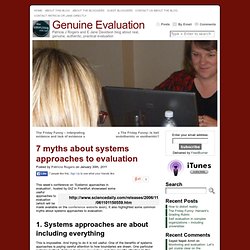
It also highlighted some common myths about systems approaches to evaluation: 1. Systems approaches are about including everything This is impossible. And trying to do it is not useful. 2. This myth follows on from a misconception that systems approaches require measuring everything. 3. Connected Curriculum. Connected Curriculum aims to ensure that all UCL students are able to learn through participating in research and enquiry at all levels of their programme of study.
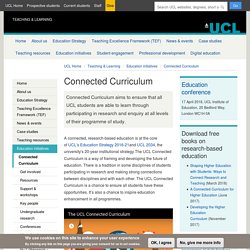
A connected, research-based education is at the core of UCL's Education Strategy 2016-21and UCL 2034, the university's 20-year institutional strategy.The UCL Connected Curriculum is a way of framing and developing the future of education. There is a tradition in some disciplines of students participating in research and making strong connections between disciplines and with each other. The UCL Connected Curriculum is a chance to ensure all students have these opportunities. It’s also a chance to inspire education enhancement in all programmes. Improving experiences for both students & staff. HOW TO Prepare The Future Generation of Physicians - The Medical Futurist. As patients are becoming the point-of-care, the doctor-patient relationship has started to shift towards an equal-level partnership, and digital technology plays a more and more critical role in healthcare, it is of utmost importance to prepare the future generation of physicians for what they could expect during their future career.
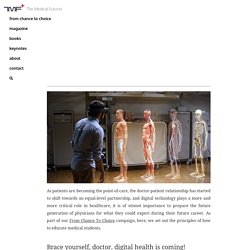
As part of our From Chance To Choice campaign, here, we set out the principles of how to educate medical students. The advancement of digital technologies, IT and the appearance of the internet with social media channels set profound changes in healthcare in motion. The high walls of the ivory tower of medicine started to crumble: vast sources of knowledge became available for anyone online, and social media channels have connected patients of many backgrounds with similar symptoms. The power of online communities, as well as empowered patients, appeared, pushing for a more equal-level doctor-patient relationship. But first things first. Doctors Should Play Board Games to Get Better At Teamwork - The Medical Futurist.
As a hospital manager, you should solve resource problems at your medical facility, as a doctor, you should diagnose sepsis well, and above all, communicate smoothly and efficiently.
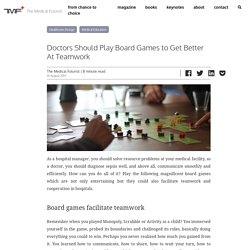
How can you do all of it? Play the following magnificent board games which are not only entertaining but they could also facilitate teamwork and cooperation in hospitals. Remember when you played Monopoly, Scrabble or Activity as a child? You immersed yourself in the game, probed its boundaries and challenged its rules, basically doing everything you could to win. Perhaps you never realized how much you gained from it. What you did as a child, had all the characteristics you should have as an adult for being a great team player. And even if the two seem to be far away from each other: board games can help medicine and healthcare as well. But physicians don’t really have time to go on team building events or vacations together.
This game was meant to improve teamwork. Derek Cabrera, systems thinking, and DSRP. What is systems thinking?
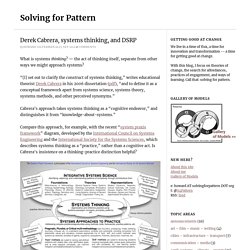
— the act of thinking itself, separate from other ways we might approach systems? “[I] set out to clarify the construct of systems thinking,” writes educational theorist Derek Cabrera in his 2006 dissertation (pdf), “and to define it as a conceptual framework apart from systems science, systems theory, systems methods, and other perceived synonyms.” Cabrera’s approach takes systems thinking as a “cognitive endeavor,” and distinguishes it from “knowledge-about-systems.” Compare this approach, for example, with the recent “system praxis framework” diagram, developed by the International Council on Systems Engineering and the International Society for the Systems Sciences, which describes systems thinking as a “practice,” rather than a cognitive act.
Is Cabrera’s insistence on a thinking-practice distinction helpful? The four conceptual patterns are: distinctions, systems, relationships, and perspectives (DSRP). The DSRP framework is illustrated by the questions: